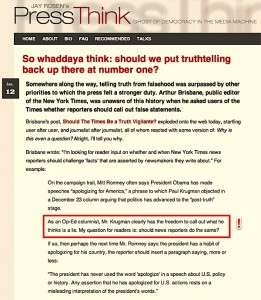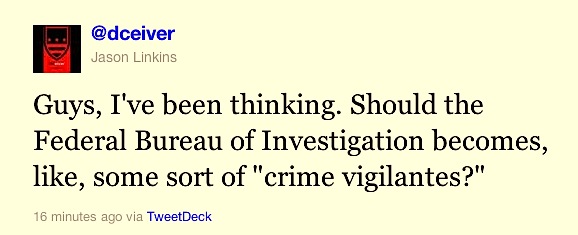Forget (for now) the place of unwanted ‘opinion’ in ‘news’ (or somewhere near by) — there’s a bigger issue at stake in modern media … whether (or not!) to call out politicians and other newsmakers for false statements they make.
As noted elsewhere, I am troubled by political activists and proxies masquerading (or fancying themselves) as something akin to news media who promulgate exaggerations and half truths. That’s beyond the pale, in my opinion, a truth FAIL, whether they like it or not … or whether they disclaim with ‘FFS, I am not a journalist …‘ when it suits them … while schizophrenically also aspiring to ‘media’ privileges like membership of the parliamentary press gallery. Oh dear.
Telling the truth seems to me to be a requirement.
But the tragedy of modern media (all media) is a sometime reluctance or unwillingness to act as what the NY Times public editor Arthur Brisbane recently called a ”truth vigillante” (as if that’s a bad thing) — and he posed it as question(!): Should The Times Be a Truth Vigilante? My response to seeing that headline in my Twitter stream was “Should the Pope be a Catholic?” Gee, Arthur. Duh.
Journalism professor Jay Rosen, whom I quote here from time to time, posted on his PressThink blog what I think is a very good response, including in part, this lament of lost courage:
Something happened in our press over the last 40 years or so that never got acknowledged and to this day would be denied by a majority of newsroom professionals. Somewhere along the way, truthtelling was surpassed by other priorities the mainstream press felt a stronger duty to. These include such things as “maintaining objectivity,” “not imposing a judgment,” “refusing to take sides” and sticking to what I have called the View from Nowhere.
No one knows exactly how it happened, for it’s not like a policy decision came down at some point. Rather, the drift of professional practice over time was to bracket or suspend sharp questions of truth and falsehood in order to avoid charges of bias, or excessive editorializing. Journalists felt better, safer, on firmer professional ground–more like pros–when they stopped short of reporting substantially untrue statements as false. One way to describe it (and I believe this is the correct way) is that truthelling moved down the list of newsroom priorities. Other things now ranked ahead of it.
But wait a minute: how can telling the truth ever take a back seat in the serious business of reporting the news? That’s like saying medical doctors no longer put “saving lives” or “the health of the patient” ahead of securing payment from insurance companies. It puts the lie to the entire contraption. It devastates journalism as a public service and honorable profession.
Devastate, like decimate and demolish, is a word that is often carelessly misused — and not just by sports reporters — but it actually fits in Rosen’s article. Letting go of the priority to be truthful — to report truthfully — is devastating, and eviscerating.
It’s awful to see some in the working news media who have backed away from making a ‘truth’ call, even when the spin they’re reporting is so obviously truth stretched too far.
Some demur for what looks like a lack of courage to even pursue hard question lines from a fear of losing access, or worse, a fear of being ostracized by the ‘newsmaker’ in question. That their management tolerates/condones/encourages this gutlessness is, well, ghastly.
To me, it’s a shocker that the question should be asked in Arthur Brisbane’s terms:
I’m looking for reader input on whether and when New York Times news reporters should challenge “facts” that are asserted by newsmakers they write about.
Hello?
Nice dose of irony in a tweet from Jason Linkins:
Any thoughts? Or further examples?
– P




Im personally one of those people fast losing any faith in media of any sort including bloggers. Everyone wants truth – even liars – of that i am certain.
Blogs are another media form – but they often appear more akin to a village idiot starting a rumour in a village filled with inbred people.
At present – post election – most seem merely content to say that truth exists only within a certain political viewpoint and within that viewpoint only.
Its why i dont like Cohen – he represents the utter hopelessness that is simply part and parcel of the landscape we now live in.
I am turning my back on politics and my answer to most will be “you voted for it … live with it …” or words and sentiments to that effect.
Saw a very nice truthbased movie … “safe harbour” … full of hope and possibility “safe harbour … saving the world one boy at a time”
Watched with tears in my eyes – and lamented the lack of love for goodness that we all seem to have. Pragmatists and cynics are the only sought after people these days it seems.
5 year olds get raped by 16 year olds – and on it goes – and no one ever seems to get beyond “how can we punish the perpetrators” to ask the question … “how in gods good name did we get to this point” … or “vote to this point” – if the cap fits then wear it.
Im disappointed in my country and myself and my fellow citizens. We’ve fucked it up and thats a truth.
Sorry to hear you’re feeling so dispirited. Hang in there, we’ve all got to deal with imperfect outcomes.
With not a trace of irony, I promise you, here are the lyrics of Leonard Cohen’s Anthem which I find inspiring for lots of reasons …
The birds they sang at the break of day
Start again I heard them say
Don’t dwell on what has passed away
or what is yet to be.
The wars they will be fought again
The holy dove She will be caught again
bought and sold and bought again
the dove is never free.
Ring the bells that still can ring
Forget your perfect offering
There is a crack in everything
That’s how the light gets in.
We asked for signs the signs were sent:
the birth betrayed the marriage spent
Yeah the widowhood of every government —
signs for all to see.
I can’t run no more with that lawless crowd
while the killers in high places say their prayers out loud.
But they’ve summoned, they’ve summoned up a thundercloud
and they’re going to hear from me.
Ring the bells that still can ring …
You can add up the parts but you won’t have the sum
You can strike up the march, there is no drum
Every heart, every heart to love will come
but like a refugee.
Ring the bells that still can ring
Forget your perfect offering
There is a crack, a crack in everything
That’s how the light gets in.
http://www.oldielyrics.com/lyrics/leonard_cohen/anthem.html
I’m not so sure hes dispirited.
He just said it like it is, and I agree with him 100%
I also am so disappointed in people everywhere. People are just so blind. Actually I will rephrase that, people have not been taught what to look for, rather than blind.
And generally speaking we have fucked it up.
http://www.noagendashow.com
As a footnote – my son pointed out to me some time ago that the oft used word ‘decimate’ is from the roman ‘decimation’ where as a punishment every tenth man in a cohort of legion was killed.
Media use it as a term implying total destruction or laying waste.
Yes, my point exactly. Words like that are often, sadly, used far too cheaply. But ‘devastate’ IMO fits in Rosen’s use, as I said. -P
Sadly happens all the time.
Example a Terrorist.
Basically the public now attributes a Terrorist as someone who breaks the law. Thanks to the wonderful paid Journos who never promulgate exaggerations and half truths.
http://www.noagendashow.com
Here’s Vanity Fair‘s spoof of the ‘should journalists be truth vigilantes?’ question:
Funny.
http://m.vanityfair.com/online/daily/2012/01/Should-emVanity-Fairem-Being-a-Spelling-Vigilante?currentPage=all
Not dispirited Peter – not at all. I appreciate the sentiments and the words of the Anthem are nice – but just imagining Cohens sepulchral tomblike hopeless vocalisation is enough to destroy the lyrics for me.
After this last election – i now watch the TV news selectively and read the Paper extremely selectively and through a filter – called extreme distrust and disgust. I dont listen much to radio except the concert programme – i dont want disembodied voices intruding into my space.
Blogs have become somewhat like watching cheap street vendors looking for opportunities and gullible people. Fast talking deceitful wide-boys all …
Our media and the socalled blogging community are an open sewer spewing forth their nonsense and being paid to do so – either in coin, opportunity or ego-points.
Short and sweet, Peter you seem to be coming from the viewpoint Journalists don’t promulgate exaggerations and half truths. Well they do all the time and they are paid for it. And more often follow pre-conceived Agenda’s. The others (such as yourself here) also promulgate exaggerations and half truths. But generally do it for free and with lesser pre-conceived ideas and its often just opinion. So who’s worse here?
As I have stated before Journalists are freaked out the likes of Bloggers will drive them from their jobs. So come up with this sort of angle to segregate themselves to discredit the Bloggers. Suck it up Journos your no better than free material available everywhere. And in many ways are worse.
Ok, so not so short.
http://www.noagendashow.com
Gee, pretty sad picture, you guys, judging by your laments … Lies and exaggeration to (and from) the left and the right, and the ‘accursed’ media.
Abandon hope all ye who enter here?
Not my cup of tea. Although I am critical and, at times, a fault-finder, I still see and appreciate good performance … at times.
Cheer up. We could be in Putin-land.
– P
Image: http://themetapicture.com/why-are-you-sad/
I guess it is a negative/sad angle we come from but I prefer to go through life with my eyes wide open. And a self confessed Skeptic. I always appreciate true good performance at all times.
Cute photo.
http://www.noagendashow.com
[…] But then, I can just hear him saying ‘FFS, I’m not a journalist.’ […]
[…] I agree. Indeed he is not. As I said in Lack of truthtelling devastates media, old & new I am troubled by political activists and proxies masquerading (or fancying themselves) as something […]